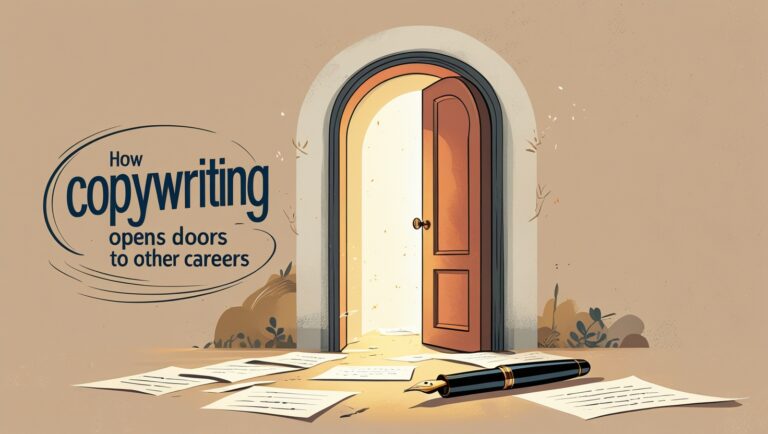Can You Just Figure Out Copywriting on Your Own?
Learning copywriting may sound like a simple process. Many people think they can read a few articles, watch a couple of videos, and instantly write sales pages that captivate buyers.
Yet, there is much more to mastering persuasive writing than meets the eye. In this article, you will explore why self-teaching feels tempting, how to structure your approach, and where to find effective support. You will also see how real-world stories and expert insights can accelerate your progress, boost your confidence, and help you become a skilled copywriter.
The Reality of Self-Teaching in Copywriting
“Can’t I just figure this out on my own?” This question echoes in the minds of countless aspiring copywriters. It is tempting to believe that you can seamlessly absorb the subtle art of persuasive writing by reading blogs or studying successful ads.
However, copywriting is not merely about stringing words together. It involves understanding target audiences, market psychology, and the nuances of brand messaging. You must develop skills in strategy, research, and empathy to craft copy that resonates. While self-teaching can yield basic skills, it often takes far longer and carries a higher risk of picking up bad habits.
Moreover, top companies rely heavily on professional copywriters to reach their audiences with clarity and impact. They know that a single weak headline or unclear call to action can sabotage an entire campaign. This means that competition is steep, and potential employers or clients often look for more than self-taught guesswork. Indeed, it is possible to gain momentum on your own, but you might be missing crucial pieces that only structured guidance can provide.
Key Building Blocks for Mastery
To refine your approach, you need to understand that learning copywriting requires multiple building blocks. Each one supports the next, contributing to a cohesive set of skills that can make your writing stand out.
- Market Research
Solid research skills are at the heart of every high-performing copywriter. You must learn how to investigate your target audience’s problems and desires. Effective copy often reveals these pain points and then provides a solution in a tone that aligns with the reader’s mindset. - Emotional Triggers
Copywriting thrives on emotions that lead to action. Though your words may appear straightforward on the page, they need to trigger deeper feelings of urgency, excitement, or curiosity. Subtle cues, such as positive testimonials or references to scarcity, can prompt your audience to respond right away. - Clarity and Brevity
Concise writing ensures that your message does not drown in a sea of words. Each sentence must drive the reader forward, whether you are composing a Facebook ad or a long-form sales page. This style can only come from constant practice and clear feedback from experienced mentors or peers. - Storytelling
Storytelling gives your marketing messages a personal touch. People remember narratives more readily than facts or statistics. A compelling story woven into your pitch can transform prospects into loyal buyers because they see themselves reflected in the journey you describe. - Conversion Techniques
Ultimately, copywriting aims to persuade a reader to take a specific action. That could mean making a purchase, opting into an email list, or scheduling a call. Strong headlines, logical structure, and an irresistible offer are all parts of effective conversion.
When you try to put these pieces together alone, it can be hard to identify your blind spots. Online resources can provide helpful tips, but there is a difference between memorizing bullet points and applying them in real-world scenarios.
The Value of Mentorship and Expert Guidance
If learning copywriting were as simple as watching a few tutorials, top-tier agencies and high-earning freelancers would not place such emphasis on formal training or mentorship. Guidance from seasoned professionals can sharpen your instincts and offer insider insights.
Authority: Working or learning under an expert gives you immediate credibility. When prospective clients or employers see that someone with proven results has guided you, they are more inclined to trust your abilities. This subtle form of social proof can open doors that might otherwise remain closed.
Feedback Loop: Self-study can leave you in an echo chamber of your ideas. You might write impressive sentences according to your standards, only to discover they do not truly motivate readers to act. A mentor or coach can pinpoint these shortfalls right away and suggest fixes that you might never have thought of. This saves you years of trial and error.
Practical Tools and Shortcuts: Mentors often share templates, checklists, and proven frameworks. These resources compress years of experience into easily digestible lessons. Instead of reinventing the wheel, you can focus on practising refined methods that already have a track record of success.
To illustrate, many mentors teach a concept known as the “AIDA” formula (Attention, Interest, Desire, and Action) to organize copy effectively. The difference between reading about AIDA and applying it under expert supervision can be transformative. With timely feedback, you learn to refine each component for maximum impact.
Tools and Resources for Rapid Improvement
In today’s digital landscape, there is no shortage of websites, podcasts, and online courses dedicated to learning copywriting. While it is possible to begin with free resources, strategic investments in professional platforms can accelerate your growth.
- Online Masterclasses: Reputable marketing websites such as Copyblogger offer courses taught by industry veterans. These courses go beyond the basics and tackle real-world examples, ranging from email sequences to landing page optimization.
- Certifications and Workshops: Organizations like the American Marketing Association frequently host workshops, webinars, and certification programs. These events often invite accomplished copywriters to share their insights and best practices.
- Books and Classics: Do not underestimate the power of time-tested literature on persuasive writing. Legendary figures like Claude Hopkins and David Ogilvy have works that remain relevant today. Reading and analyzing these classics can refine your approach to engaging your audience.
- Private Communities: Many expert copywriters run membership communities. These forums and group coaching sessions offer a chance to network, share feedback, and learn from peers who are experiencing similar challenges. The collaborative environment can help you stay motivated and spot new trends in the market.
When you combine these resources with expert mentorship, you build a system of continuous improvement. That level of structure often proves invaluable because it keeps you on track and prevents you from floundering with incomplete methods.
Practical Steps to Accelerate Your Learning

Even with a clear roadmap, the question remains: What can you do right now to elevate your copywriting skills more quickly? Below are some practical steps you can implement regardless of your current skill level.
- Start with High-Level Outlines
Before writing a single word of copy, map your content. Identify your main message, bullet out your supporting points, and ensure each section leads to the next. This approach keeps your writing organized and persuasive. - Collect Real-World Inspiration
Study successful sales pages or ad campaigns and note the techniques used. Watch how they address pain points, introduce scarcity, or build trust. Pay attention to the style and flow. Then incorporate those lessons into your writing experiments. - Leverage Focused Practice
Set aside time each day to write short headlines, taglines, and calls to action. Focus on one core principle at a time, like urgency or empathy. This way, you gradually perfect each skill component without overwhelming yourself. - Seek Expert Feedback
If you have a mentor or access to a community of experienced writers, share your drafts and ask for pointed critiques. Embrace corrections as a path to improvement. It is far better to learn from a single piece of feedback than to repeat the same mistake on multiple projects. - Challenge Yourself with Deadlines
Give yourself a set period to complete each piece of writing. This method replicates the pressure you will feel with real clients and encourages you to produce cleaner copy in less time. Over time, this boosts your confidence and speed. - Track Results and Iterate
Whenever possible, measure the impact of your copy. Track how many people clicked a link or how many conversions resulted. Then refine your approach based on the data. This cycle of writing, measuring, and adjusting transforms you into a results-driven writer.
Overcoming Common Doubts: “Can’t I Just Figure This Out on My Own?”
People often wonder if paying for a course or mentorship is truly necessary. The question “Can’t I just figure this out on my own?” seems fair, especially if you have already invested time reading about copywriting or analyzing some of your favorite ad campaigns.
You can certainly develop some foundational skills on your own, but you risk reaching a plateau. In the fast-paced world of marketing, it is not enough to rely on trial and error. Mentors and structured programs deliver proven systems, preventing you from making the same mistakes others have already navigated.
You also have to consider the competitive landscape. Businesses worldwide hire copywriters who demonstrate advanced techniques and measurable results. When you compare a self-taught writer with someone who has been guided by seasoned experts, the quality difference can be evident. If you want to stand out, investing in streamlined learning is a strategic move that often pays for itself over time.
For a deeper look at what a copywriter’s life entails, explore this resource on what it is like to work as a copywriter. You will see how professionals in this field approach day-to-day tasks and client challenges.
Stories of Success (Social Proof)
Consider Samantha, a freelance writer who initially attempted to learn everything on her own. She consumed free videos and wrote blog posts for small businesses. Although she understood general writing tips, her clients rarely renewed contracts because her copy was not converting.
Realizing she needed a more structured approach, Samantha enrolled in a specialized copywriting mentorship program. She learned how to research deeper into customer psychology and refine her headlines to spark immediate interest. She also adopted templates for email funnels that used clear, concise messaging. Within six months, Samantha saw her client base expand, and she began receiving referrals from satisfied customers.
Samantha’s success story highlights the difference that guided instruction can make. By investing in a proven system, she saved herself from years of guesswork and established a sustainable, profitable career.
Why Good Copywriting Matters So Much
You might ask: “Why invest so much effort into learning copywriting when many online tools offer automated writing services?” The answer lies in the power of human connection. Persuasive copy requires emotional intelligence and a deep understanding of your audience’s mindset.
- Competitive Edge: A strong message differentiates your product or service from countless others in the market. High-level copywriting helps you stand out and resonate with your ideal buyers.
- Brand Credibility: Trustworthy and well-crafted content boosts your brand image. Customers sense when an organization cares enough to communicate clearly and personally.
- Long-Term Value: Copy that moves people to act can generate steady revenue. Whether you run ads or rely on email campaigns, powerful messaging yields long-term returns.
Without skilful copy, even a groundbreaking offer can get lost in the crowd. This is why businesses big and small prioritize hiring proficient writers over churning out generic text from unvetted sources.
Setting the Right Expectations
When you begin learning copywriting, it can feel like an uphill climb. Many students find the initial jargon or psychology theories daunting. That is normal. To succeed, set realistic milestones and treat each achievement as part of a broader journey.
Aim for small but significant wins. Write a compelling subject line for your email newsletter. Tweak the body of a promotional message to increase clicks. Celebrate each improvement while remaining open to continuous learning and adaptation.
Do not be discouraged by rejections or less-than-stellar results at first. Every successful copywriter has endured setbacks or critiques. The difference is they used those lessons to refine their craft rather than give up in frustration.
Crafting Your Unique Voice
As you immerse yourself in courses and expert guidance, you will pick up established formulas that consistently generate sales. While these are valuable, remember to develop your own voice. Audiences connect with authenticity. They sense when someone writes from a place of genuine understanding and empathy.
Strike a balance between proven templates and personal flair. If you are too rigid with formulas, your copy may read like everyone else’s. On the other hand, if you ignore time-tested structures, you risk losing clarity and effectiveness. Blending these elements takes experience, so give yourself the time and freedom to experiment.
Conclusion
Mastering the craft of copywriting can indeed begin with personal exploration. However, the fastest and most effective route is usually a combination of self-study, mentorship, and ongoing practice. With targeted guidance, you will build a portfolio that sets you apart and fuels consistent growth.
If you are ready to take your skills to the next level, consider finding a reputable mentor or enrolling in a comprehensive training program. You have learned the core aspects of persuasive writing, discovered the value of feedback, and seen how small changes can yield big results. You do not have to figure everything out on your own. Start refining your approach today and tap into the power of compelling, high-converting copy.
Ready to make the leap and become a professional? Subscribe to industry newsletters, join a dedicated community, or enrol in a specialized course. Begin your journey toward premium clients and lasting success in the exciting copywriting field.
FAQ
How Long Does It Take to Learn Copywriting?
The timeframe varies widely. Some see a noticeable improvement in a few weeks, especially with the right mentorship. Others may take months or even years to refine their style. Your progress will depend on how often you practice, the quality of feedback you receive, and your willingness to learn from mistakes.
Can I Succeed Without a Formal Writing Background?
Absolutely. Successful copywriters come from fields like psychology, journalism, or business. What matters most is your ability to understand audience needs and craft resonating messages. You can hone these skills regardless of your initial background with consistent effort and proper guidance.
Are There Free Resources Worth Exploring?
Yes. Sites like Copyblogger and HubSpot’s marketing blog offer free insights on writing techniques and strategies. However, combining these resources with professional mentorship or structured courses can accelerate your learning curve significantly. The synergy of practical guidance and targeted content often delivers the best results.







One Comment
Comments are closed.